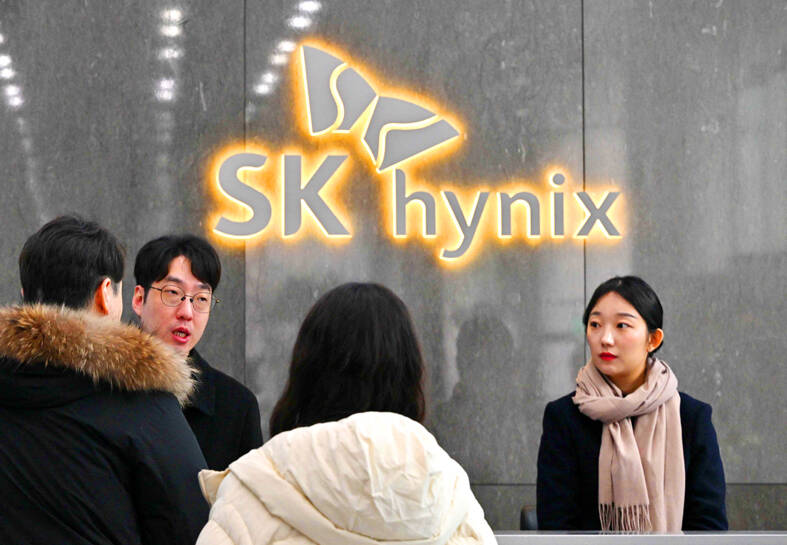SK Hynix Inc plans to spend US$3.87 billion building an advanced packaging plant and research center for artificial intelligence (AI) products in Indiana, marking a win for US President Joe Biden’s administration as it seeks to increase semiconductor output on US soil.
The world’s No. 2 memorychip maker said it would build its first US facility in West Lafayette, with plans to begin mass production in the second half of 2028. The plant will center on a production line for next-generation high-bandwidth memory (HBM) chips, critical components of the graphic processors that train AI systems.
SK Hynix has evolved into a key player in the AI development boom as the leading designer and producer of HBM chips, which work in tandem with Nvidia Corp’s processors.

Photo: AFP
Its decision comes about two years after the company announced plans to invest in the US. At the time, SK Group chairman Chey Tae-won said his conglomerate would set aside about US$15 billion to build chip facilities and bolster research programs in the US.
Wednesday’s announcement is part of that total commitment, the company said.
SK Hynix has also applied for grants from the CHIPS and Science Act, which is aimed at promoting the return of semiconductor manufacturing to the US.
SK Hynix’s project marks a significant step forward for US ambitions to add advanced packaging capacity — a bottleneck in Washington’s efforts to revitalize the domestic semiconductor industry. The US has only 3 percent of the world’s packaging capacity, meaning that firms manufacturing chips in the US often still have to ship them to Asia to be assembled for use.
Semiconductor firms have pledged to invest more than US$230 billion on US soil since Biden took office, spurred by the 2022 chips legislation.
Intel Corp last month won US$8.5 billion in grants and as much as US$11 billion in loans from the US to support more than US$100 billion in investments at home.
The Biden administration also plans to award more than US$6 billion to SK Hynix rival Samsung Electronics Co and more than US$5 billion to Taiwan Semiconductor Manufacturing Co (TSMC, 台積電).
Most of those investments have so far gone to Texas, New York and Arizona. The Grand Canyon state alone has secured more than US$60 billion in investments from TSMC, Intel, Amkor Technology Inc and dozens of others.

UNCERTAINTY: Innolux activated a stringent supply chain management mechanism, as it did during the COVID-19 pandemic, to ensure optimal inventory levels for customers Flat-panel display makers AUO Corp (友達) and Innolux Corp (群創) yesterday said that about 12 to 20 percent of their display business is at risk of potential US tariffs and that they would relocate production or shipment destinations to mitigate the levies’ effects. US tariffs would have a direct impact of US$200 million on AUO’s revenue, company chairman Paul Peng (彭雙浪) told reporters on the sidelines of the Touch Taiwan trade show in Taipei yesterday. That would make up about 12 percent of the company’s overall revenue. To cope with the tariff uncertainty, AUO plans to allocate its production to manufacturing facilities in

Taiwan will prioritize the development of silicon photonics by taking advantage of its strength in the semiconductor industry to build another shield to protect the local economy, National Development Council (NDC) Minister Paul Liu (劉鏡清) said yesterday. Speaking at a meeting of the legislature’s Economics Committee, Liu said Taiwan already has the artificial intelligence (AI) industry as a shield, after the semiconductor industry, to safeguard the country, and is looking at new unique fields to build more economic shields. While Taiwan will further strengthen its existing shields, over the longer term, the country is determined to focus on such potential segments as

TAKING STOCK: A Taiwanese cookware firm in Vietnam urged customers to assess inventory or place orders early so shipments can reach the US while tariffs are paused Taiwanese businesses in Vietnam are exploring alternatives after the White House imposed a 46 percent import duty on Vietnamese goods, following US President Donald Trump’s announcement of “reciprocal” tariffs on the US’ trading partners. Lo Shih-liang (羅世良), chairman of Brico Industry Co (裕茂工業), a Taiwanese company that manufactures cast iron cookware and stove components in Vietnam, said that more than 40 percent of his business was tied to the US market, describing the constant US policy shifts as an emotional roller coaster. “I work during the day and stay up all night watching the news. I’ve been following US news until 3am

COLLABORATION: Given Taiwan’s key position in global supply chains, the US firm is discussing strategies with local partners and clients to deal with global uncertainties Advanced Micro Devices Inc (AMD) yesterday said it is meeting with local ecosystem partners, including Taiwan Semiconductor Manufacturing Co (TSMC, 台積電), to discuss strategies, including long-term manufacturing, to navigate uncertainties such as US tariffs, as Taiwan occupies an important position in global supply chains. AMD chief executive officer Lisa Su (蘇姿丰) told reporters that Taiwan is an important part of the chip designer’s ecosystem and she is discussing with partners and customers in Taiwan to forge strong collaborations on different areas during this critical period. AMD has just become the first artificial-intelligence (AI) server chip customer of TSMC to utilize its advanced